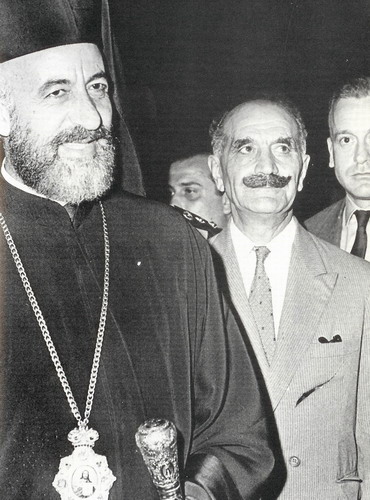

Archbishop Makarios III of Cyprus became the nation's first President when Britain granted the island independence in 1959. In his three terms (1959-1977), he survived four assassination attempts and a 1974 coup. Born Michael Mouskos, Makarios was elected bishop of Kition in 1948 and archbishop of Cyprus in 1950. Leader of the Greek Cypriots in the movement for enosis (union with Greece), he was exiled by the British in 1956 on charges of encouraging terrorism.
In 1958 he begins to press for Cypriot independence from Great Britain rather than union with Greece. When an agreement is reached on the independence of Cyprus, he is elected president. He pursues a neutralist policy, favoring a peaceful solution between the island's Greek and Turkish communities.
In 1972 he came under increasing pressure from the Greek government to allow for greater Greek influence in Cypriot affairs; the Cypriot Orthodox Church pressured him to resign if he failed to do so. Gen. George Grivas (also in photo), leader of the enosis movement, launched a terrorist campaign aimed at overthrowing Makarios, finally succeeding in July of 1974, when a Greek Junta-sponsored coup deposes Makarios declaring that he is dead in the rubble of his palace. But shortly thereafter Makarios's voice is heard on the radio telling his people that he is alive and that they should resist the leaders of the coup. When Turkey invades the island it precipitates the fall of the Junta in Athens. After several months of exile he returns to Cyprus and resumes the presidency.
When Makarios died in August of 1977 of a heart attack the funeral is interrupted by a rainstorm, unheard of in Cyprus for that month. Some call it a miracle. Greek Cypriot newspaper refer to the extraordinary event as proving an old Greek proverb, that when a good man is buried, even the heavens shed tears. A Turkish Cypriot newspaper however, said that the un-seasonal rain had proved an old Turkish proverb, that when an evil man is buried, the heavens open to wash away his misdeeds. Regardless of what people thought of him, Makarios' leadership created an identity for Cypriots that went beyond being Greek or Turkish.